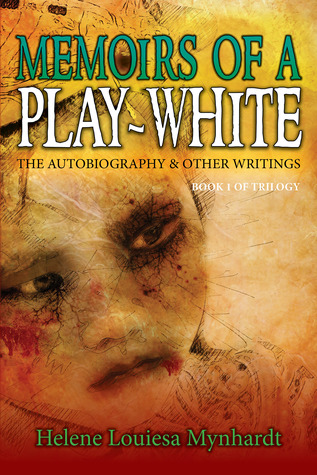Memoirs of Play-White
Autobiography/Memoir
Helene Louiesa Mynhardt
Released
Reach Publisher's Services, South Africa
Paperback $12.99
Kindle $2.99
Buy on
Amazon
Buy $7.99 on
Barnes and Noble
About the Story:
Louiesa, an impoverished child,
was raised by her unemployed single mother. She was employed part time as a
student, earning a lucrative salary. The reason was unclear to her until she
was confronted by a furious co-worker. The author explains how siblings from
the exact same parents were classified differently and gives details about how
children with a darker complexion were abandoned by fair-skinned parents. The
author further explains in great detail, deep rooted segregation not previously
exposed to the world during apartheid: how racial classification destroyed
family unity and friendships. Forceful resettlement according to race destroyed
family life and friendships.
Apartheid was abolished for one
day during 1985 and all races lived in harmony next to each other. For once in
the history of apartheid blacks were given a privilege denied to whites. South
Africa sent two contestants to the Miss World pageant representing whites and
non-whites respectively. The outcome of the results stunned the National Party
and the entire world. Blacks created their own entertainment with much success,
attracting international stardom and subsequently departing from S.A. due to
racial biases and political interference with irrational censorships. Journey
with the author while experiencing her personal encounters: death penalty, gang
violence, teenage pregnancies, alcoholism and starvation. She endured extreme weather
conditions without proper clothing.
This is truly an inspirational
story of hope and transformation. Readers are invited to journey through the
remarkable life of the author who dreamt of freedom from poverty barriers,
worked hard towards it with dogged determination and succeeded. During the
first democratic elections the ANC party did not win an outright majority due
to the coloured votes. The author takes the reader on a journey into the lives
of the coloured race during apartheid, sparing no detail.
My Review
Mynhardt’s autobiographical memoir begins with the story of
her grandmother and mother, women of Xhosa heritage who’d we’d call today victims
of servitude in their small villages. To those of previous generations, life
was hand-to-mouth, making and raising babies with little male support.
By the time Mynhardt’s mother
Doris gave birth to her, Doris had been widowed and shunned by Muslim in-laws.
Her successful food vendor shops had been taken and her first children eventually
removed. Doris raised her daughter Elena in poverty. Elena was officially named
Helene by a zealous administrator who registered the birth in order to potentially
provide better opportunities with an Afrikaans-sounding name.
When it came time to Helene to decide how to take control of
her own future, she chose to continue her education even if she didn’t like it
all that much and it was expensive, and became a fair typist. Her
self-confidence led her to step into the world of finances in the
mid-seventies, applying for a job at a bank. She worked her way through several
departments and promotions, too often fighting for her personal rights as well
as rampant fraudulent practices.
Told in a jarring, journalistic and forthright manner,
readers are taken on a journey of the dark underworld of abuse, apartheid, and
social casting in South Africa, from the 1950s through the first democratically
elected black president in 1994.
From Destitude to Plentitude
Released June 2018
Reach, South Africa
$2.99 Kindle
$12.99 Print
About the Book:
In this book, author writes about her triumphant
entrepreneurial victory from an impoverished background. As a self-made
entrepreneur, she identified and successfully pursued a business opportunity
with her employer who granted her a rare chance to be placed on their panel as
an external vendor (debt collector) before BEE became law. Although Louiesa
treated her business partners as equal she did not receive the same
reciprocation from them. Find out how laws are altered and manipulated to
benefit the rich at the expense of the poor. The possible reason why South
Africa is unable to narrow the gap between the rich and the poor is
scrutinized. Read about how the change in government policy on dividend
taxation saved the day.
Journey with the author, as she faced numerous business challenges on her own,
ranging from fraud to sexual harassment, cultural barriers, and external
auditors investigating fraudulent payments. Follow her story of how she
witnessed firsthand racism towards fellow panel members. Without legal
qualifications or any help, she became the legal representative in court cases
representing their business. Her carefully planned strategies resulted in
arrests and imprisonment. Numerous other interesting stories are included to
analyse and explain the overall life challenges and constraints that ordinary,
poor and struggling South Africans face.
The reason why the South African white race could not be “pure” is also
explored with ample examples. Find out how fair-skinned parents abandoned
darker-skinned children and how a coloured child was born to white parents.
South African legislation was intended to serve everybody. However,
manipulation and alteration from its original meaning and intention resulted in
benefiting the rich at the expense of the poor. Find out possible reasons why
the author alleges poor people in South Africa became poorer due to the debt
trap they found themselves in. The government is constantly changing the laws
but finding it difficult to keep up with ongoing manipulation. The author
identifies exploitation of the poor and the vulnerable by big businesses.
This is truly a remarkable journey in the life of Louiesa who did not allow
poverty barriers to curb her success. Her dogged determination made it possible
for her to succeed despite many obstacles that she sees as prohibitive poverty
barriers to many ordinary South Africans. She believes that South Africa is the
world’s most unequal society and it is difficult to manage constant
manipulation. The author further shares interesting information about how one
thousand South Africans were reclassified under what is today known as the
chameleon dance.
My review:
Mynhardt's frank and critical autobiography challenges
conceptions and misconceptions of world trade. Whatever you thought you understood
about apartheid and progress, it's worse. Here's one example of the regulatory
practices Louiesa fights: Some of South Africa’s laws were ambiguous and left
open to interpretation. There were a few ambiguous rules that were not illegal
but when raised as a defence, it would be illegal for someone to pursue that
matter. One of the examples of these laws was the “in duplum rule” mentioned
previously, which stated that no one was allowed to pay more than double the
original loan amount, inclusive of interest and legal fees. Rich, educated
debtors with legal representatives knew about this rule and could raise a
defence that they were not willing to pay more than what the “in duplum rule”
stipulated. And as soon as someone mentioned this rule, the vendors were not
allowed to pursue the matter and the file had to be withdrawn and closed. This
rule was a defence that was only applicable when mentioned. Since it was not a
law but merely a defence, it was not illegal to disregard this rule - unless
raised as a defence. However, big businesses had outdated computer systems that
did not take this rule into account, which meant their systems continued to
charge interest. Sometimes a person would pay 10 times the amount he was
legally supposed to. Although EDS computer systems promised to introduce
sophisticated to one of the South African banks, their system did not work in
the South African market because it was unable to stop the interest when
reaching the “in duplum” limit (pp 98-99).
The book is memoir, essay, deconstruction of a devastating
socio-economic practice, yet a triumph to persistence. Mynhardt's story of
dealing with today's business culture is teeth-rattling, annoying, absurd at
times, and sometimes heart-wrenching, but provides an air of triumph.
Begin your journey with Mynhardt's Memoirs of Play-White. You'll be able to answer a
resounding yes the question Louiesa was asked, “Do you honestly think that you
have lived such a fantastic life that readers would be interested in reading
about it?”
About the Author
Louiesa Mynhardt is a self-made entrepreneur, founding
member and Managing Director of Sterling Debt Recoveries that is a leading
collection agency, founded in 1998. She has a 40% shareholding in this
business. Sterling Debt Recoveries provides efficient, large scale services on
a commission basis to large credit-granting institutions. She is a novice
author who was born in Kliptown, Johannesburg in the late 1950s and is married
to Harold. They have two daughters studying abroad.









